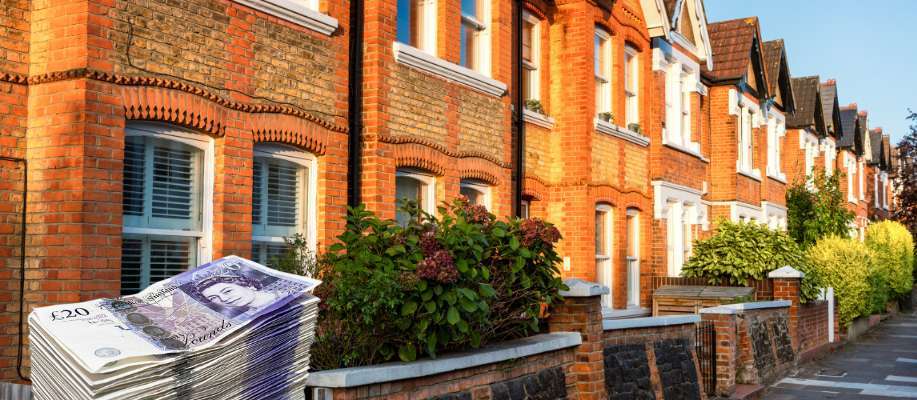
Buying or selling a property can be a complicated and expensive process. Throw in an intermediary such as a property sourcing specialist, and things can be even more tricky and pricey if you're outside your comfort zone.
One aspect that often confuses people is property sourcing fees.
Understanding the deal sourcer fee is important for anyone looking to invest in the UK property market – it could literally make or break a deal in terms of the ROI being worth your initial invesment.
What will I learn about property sourcing fees
The sourcing fees are charged by property sourcers, who act as intermediaries between buyers and sellers. They help investors find off-market properties and negotiate deals. However, the fees charged by deal sourcers can vary greatly, depending on a range of factors.
In this comprehensive guide, we will cover everything you need to know about property sourcing fees. We'll explain what they are, how they are charged, and the factors that can influence their cost. We'll also look at different types of property sourcing fees and provide tips for negotiating them.
Whether you're a seasoned property investor or new to the market, this guide will help you better understand property sourcing fees and make more informed investment decisions.
Key takeaways
- Property sourcing fees are charged by intermediaries, called property sourcers, who help investors find off-market properties and negotiate deals (on behalf of their investor clients).
- The fees charged by a property deal sourcer can vary greatly depending on a range of factors, such as location, property type, their reputation, and the level of expertise required for a specific deal.
- There are different types of property sourcing fees, including upfront fees, success fees, and retainer fees, and it's important to understand each fee structure.
- Investors should evaluate the value of property sourcing services in relation to the fees charged, taking into account factors such as experience and track record.
- It's important to consider the legal aspects of sourcer fees, including contracts, property sourcing compliance with industry regulations, and transparent fee agreements.
What are property sourcing fees?
Property sourcing fees are charges levied by professionals, who specialise in finding off-market properties for investors, to locate and analyse suitable properties for purchase. The property sourcer's ultimate goal is to match the buyer with an ideal property that meets their specific requirements and investment goals, while also ensuring a reasonable return on investment (ROI).
A property sourcing company can offer a range of services, including identifying properties that are not listed on the open market (i.e. "off-market" properties), analysing their potential, managing the sourcing process, negotiating the purchase, and liaising with solicitors. They have in-depth knowledge of the property market, access to industry databases, and extensive networking and deal-sourcing skills.
Property sourcing fees are a way for professionals to charge for their services. The fees can be structured in a variety of ways, and their structure depends on the specific services provided.
Services provided by a property deal sourcer
The services provided by deal sourcers can vary depending on their expertise and the needs of the investor. In general, their services may include, but are not limited to:
- Identifying suitable off-market properties that match the buyer's specific requirements.
- Carrying out extensive research and analysis of the property market and individual properties.
- Conducting site visits and inspections to assess the property's condition and potential future value.
- Assisting with the negotiation process and liaising with solicitors or conveyancers.
- Providing guidance and support throughout the purchasing process, and after the sale is completed.
Charging for property sourcing services
A property deal sourcer may charge for their services in various ways, such as upfront fees, success fees, or retainer fees. These fees are negotiable and typically depend on the level of service provided by the sourcer as well as their credibility.
Some deal sourcers charge an upfront fee to initiate the property sourcing process, while others may charge a success or "close" fee after completing the transaction. A success fee is usually a percentage of the purchase price and is payable on completion of the sale.
Retainer fees are another common way for sourcers to charge for their services. They are usually charged on a monthly basis and allow investors to retain the services of a property sourcing agent for a set period of time (sometimes exclusively!), during which the deal sourcer will source potential deals and present them to the investor.
The fees charged by sourcers can vary depending on the level of service provided, the type of property, and the location. For example, fees for sourcing commercial properties or properties in prime locations may be higher than those for residential properties or those in less desirable areas.
Tip: It's important to have clear and transparent fee agreements in place before engaging the services of a property sourcer. The agreement should outline all fees associated with the transaction, including any additional charges, such as legal fees or stamp duty.
Factors influencing property sourcing fees
There are several factors that can influence the amount charged. These fees can vary widely depending on location, property type, market demand, and the level of expertise required for a specific deal. In this section, we will explore each of these factors in more detail.
Location
The location of a property can have a significant impact on the sourcing fee charged. Properties in high-demand areas, such as London, may command higher fees due to the increased competition for off-market deals. On the other hand, properties in less popular areas may have lower fees as sourcers may have fewer opportunities available to them.
Property type
The type of property being sourced can also impact the fee charged. For example, properties with higher potential returns, such as HMOs or commercial properties, may have higher fees due to the increased level of analysis and expertise required. Similarly, more complex deals, such as those involving multiple properties or joint ventures, may also have higher fees due to the increased level of work involved.
Market demand
The level of competition and demand in the property market can also impact sourcing fees. In a hot market where properties are selling quickly, the fees may be higher due to the increased competition for off-market deals. On the other hand, in a slower market, fees may be lower as the property deal sourcer has more time to find deals and may be more willing to negotiate fees.
Level of expertise required
The level of expertise required for a specific deal can also impact the fee charged. For example, a deal that involves extensive due diligence and analysis may require more time and expertise, resulting in a higher fee. Similarly, deals that require a unique set of skills or knowledge, such as those involving planning permission or conservation areas, may also have higher fees due to the specialised expertise required.
Reputation
Does your prospective deal sourcer have a large social media following? If so, it's likely they can demand a higher property sourcing fee.
Simply because they're more well-known and likely have a larger crop of investors to work with, either patiently waiting for their services of actively in the mix buying deals.
If the property sourcer has a high demand (e.g. investors) for his/her services and they have the supplies (e.g. properties) to package and offer, then you have a bit of competition to get their attention. Usually the the solution is to pay them more money...
Different types of deal sourcing fees
When it comes to property deal sourcing, the structure of how you pay the property sourcing fee can differ. Below are some examples of the most common:
| Fee Type | Description |
|---|---|
| Upfront fee | A commitment fee paid before the deal sourcer starts working on a property deal |
| Success fee | A fee paid to the deal sourcer upon the successful completion of a property deal |
| Retainer fee | A fee paid periodically to the deal sourcer for ongoing or repeat property sourcing services |
The sourcing fees charged can vary widely depending on the sourcer and the deal's complexity. It's essential to understand the fee structure before engaging a sourcer to ensure that the fees are reasonable and commensurate with the services provided.
Sourcers typically provide a breakdown of their fees upfront, detailing precisely what services are covered and what isn't. If yours does not do that, then you'll likely run into trouble later on... It's advisable to compare the fee structures of several different property sourcers before signing a contract to ensure you're comfortable with that you may/may not pay later on.
Property deal sourcing fees in the UK typically range from 1% to 5% of the purchase price. It's less common now to find a deal sourcer charging a "fixed fee" regardless of the property price, but some still do it.
However, it's worth noting that the fee percentage charged may decrease for high-value deals or off-market deals. It's essential to negotiate sourcing fees with the sourcer to ensure a fair and mutually beneficial arrangement. It's about what you're both comfortable with!
Also, fees for off-market property deals may differ from those for on-market deals, since off-market deals are often more complex and require a more advanced level of expertise.
Property sourcing fees for off-market deals
Off-market properties can offer unique and lucrative investment opportunities. However, the sourcing fees for off-market deals can vary significantly depending on the type of property and the level of expertise required by the deal sourcer. It's important to understand the different types of off-market deals and the associated fees in order to evaluate the value of the deal.
HMO properties
Off-market House in Multiple Occupation (HMO) properties can be a profitable investment for those looking to maximise rental income. Sourcing fees for HMO properties typically range from 3% to 5% of the property value. Here's some examples for context:
| Property Value | Sourcing Fee |
|---|---|
| £200,000 | £6,000 to £10,000 |
| £500,000 | £15,000 to £25,000 |
| £1,000,000 | £30,000 to £50,000 |
These numbers look like a lot to pay for a property sourcer, but how much are you actually saving on the cost of the property itself?
For example, if the property's actual market (or on-market) value is £230,000, but a trusted deal sourcer packages it for an agree sale price of £200,000 with a property sourcing fee of £10,000, then you may have yourself a great deal – saving £20,000 overall.
Buy-to-let (BTL) properties
Off-market Buy-to-Let (BTL) properties can be an excellent opportunity for investors seeking long-term rental income. Sourcing fees for BTL properties are typically charged as a percentage of the rental income, ranging from 5% to 10% of the annual rental income.
Serviced accommodation Properties
Off-market serviced accommodation properties, such as holiday lets and corporate housing, can offer high short-term rental yields. Sourcing fees for serviced accommodation properties are usually charged as a percentage of the rental income, ranging from 10% to 20% of the annual rental income.
Commercial properties
Off-market commercial properties, such as office spaces and retail units, can provide a stable long-term investment with potential for capital growth. Sourcing fees for commercial properties are typically charged as a percentage of the property value, ranging from 2% to 5% of the property value.
When evaluating off-market property deals, it's important to consider the potential ROI and the level of expertise required by the sourcer. A skilled and experienced property sourcing agent may be able to negotiate a better deal and provide valuable insights into the property and market analysis.
Off-market deals can be a great way to find unique investment opportunities, but it's important to understand the associated fees and evaluate the potential returns on investment.
Property analysis in relation to deal sourcing fees
With property sourcing fees, understanding the role of property analysis is crucial. Property analysis involves evaluating a potential investment property to determine its value, potential return on investment, and any risks that may impact the deal. A property sourcer will use this analysis to identify and negotiate deals on behalf of their clients.
The level of analysis required can vary based on the property type, market conditions, and the deal’s complexity. As a result, the property sourcing fee may also vary depending on the analysis required. A more complex deal will typically require more in-depth analysis, resulting in a higher fee.
One common approach is a tiered fee structure based on the type of analysis required. For example, a basic analysis may involve a market analysis, property inspection, and financial assessment, resulting in a lower fee. A more comprehensive analysis may involve a detailed financial statement, property valuation, and projections, resulting in a higher fee.
| Type of Analysis | Property Sourcing Fee |
|---|---|
| Basic analysis | £1,000 - £2,500 |
| Comprehensive analysis | £5,000 - £10,000 + |
It is essential to have a clear understanding of the type of analysis required for a deal before negotiating the sourcing fee. A deal sourcer should be transparent about their analysis process and fees, outlining the level of detail and cost upfront. This clarity will help avoid any disputes or misunderstandings later in the deal.
Overall, property analysis plays a vital role in determining the value and potential of an investment property. The level of analysis required can impact the sourcing fee, making it essential to have a clear understanding of the analysis process and fee structure before negotiating with a property sourcer.
Negotiating property sourcing fees
Securing the right fees with a property sourcer can make a significant difference to your investment returns. Here are some useful tips to help you get the best deal possible:
Do your research
Before entering any fee negotiations, it's essential to do your research and know what the standard rates are for the services you require. Compare prices from multiple property sourcers to get a good idea of the market range for fees.
Be clear about your requirements
Ensure that you are very clear about the services you require from the property deal sourcer. If you can provide them with a detailed brief of your expectations, they are more likely to offer you a fair and accurate quote.
Consider the deal size
The size and complexity of the deal will influence the fees charged by the property sourcer. A more complex deal will generally require more expertise and time, and hence the fee may reflect this.
Be willing to negotiate
Don't be afraid to negotiate the fees with the property sourcer. You might be surprised at the discounts you can secure by simply asking. Just make sure that you are reasonable with your requests and don't try to lowball the sourcer.
Consider a success-based fee model
If you are confident that the deal will be successful, you may be able to negotiate a success-based fee model with the property sourcer. In this model, the sourcer is remunerated only if the deal is successfully closed.
By keeping these tips in mind, you can negotiate the best possible property sourcing fee and get the support you need to make a successful property investment.
Is there real value in property sourcing services?
Well, if you're answer is "no", then head to another page, article or site entirely right now! We're not saying the answer is an immediate "yes", but it certainly can be if the right approach is taken to work with a legitimate property sourcer.
Understanding the value of a property sourcing service is crucial in determining whether the fees charged are reasonable and justifiable. While some may see property sourcing fees as an additional expense, the value they can bring to a property deal can far outweigh the cost. Therefore, it's important to evaluate the value of a property sourcer's service before agreeing to their fees.
Check out their track record
One way to evaluate the value of a property sourcer's service is to look at their track record. A reputable deal sourcer will have a proven history of sourcing successful deals, and their clients should be willing to provide positive testimonials that demonstrate the value they have added to the process. Additionally, it's important to consider the experience and expertise of the sourcer, as this can impact the quality of the deals they source and the level of analysis they provide.
Evaluate the return on investment (ROI)
Another way to evaluate the value of a property sourcer's service is to consider the potential return on investment. A good sourcer will not only source a property deal but provide thorough analysis on the potential profitability of the investment. They should be able to identify any potential risks or challenges associated with the investment and provide strategies for mitigating those risks.
Consider how much time and effort you're saving
It's also important to consider the time and effort that a property sourcer can save an investor. Sourcing the right property deal can be a time-consuming process, but by outsourcing this task to a professional sourcer, investors can save valuable time and focus on other aspects of their investments.
An example
Let's consider an example to illustrate the value of a property sourcer's service in relation to their fees:
| Service provided by property sourcer | Fee | Potential ROI | Value of service |
|---|---|---|---|
| Property analysis and sourcing of off-market HMO | £5,000 | £50,000 | Excellent |
| Property analysis and sourcing of on-market HMO | £3,000 | £40,000 | Good |
| Property analysis and sourcing of on-market BTL | £2,000 | £20,000 | Reasonable |
In the numbers shared above, the property sourcer's fees vary depending on the type of deal sourced, but the potential return on investment is significantly higher than the fee charged in all cases.
This demonstrates the potential value of a property sourcer's service, and why it's important to evaluate the service provided in relation to the fees charged.
Overall, evaluating the value of a property sourcer's service is key to ensuring a fair and mutually beneficial agreement. By considering their track record, potential return on investment, and the time and effort they can save, investors can make informed decisions about whether a property sourcer's service is worth the fees charged, and ultimately make smarter and more profitable investments.
Legal considerations with property sourcing fees
Make sure to keep in mind the legal considerations involved in this space – it's super important.
As with any business transaction, having a clear and transparent agreement in place to avoid disputes later on, can make life a whole lot easier.
Here are some legal aspects to consider when dealing with property sourcing fees:
- Contracts: Ensure that a written contract is in place with the property sourcer outlining the services provided and the fee structure. Both parties must understand and agree to the terms of the agreement.
- Industry Regulations: Property sourcers must comply with industry regulations and standards. Make sure that the sourcer is a member of a professional body such as the The Property Ombudsman or the Property Redress Scheme, which ensures that their code of conduct is followed.
- Transparency: The fee agreement should be clear and transparent. All charges and expenses should be outlined, including any additional fees for services such as property analysis or legal due diligence. Any potential conflicts of interest should also be disclosed, such as if the property sourcer has a financial interest in the deal.
It's essential to ensure that the property sourcer is reputable and trustworthy. Due diligence should be done to verify their credentials and track record. Property sourcer reviews or testimonials can be a good way to evaluate their services.
The property deal sourcer should provide a formal contract that clearly outlines their services and the fee structure to avoid disputes later on.
Remember, the goal is to establish a fair and mutually beneficial agreement between both parties. By considering the legal aspects of property sourcing fees, buyers and sellers can avoid potential disputes and ensure a successful transaction.
Tips for finding reliable property sourcing companies
Choosing the right property sourcer is crucial for anyone looking to invest in property. With so many options available, it can be challenging to know where to start. Here are some tips to help you find a trusted deal sourcer:
1. Perform your own due diligence
Put simply, do your research. Look at their website and social media profiles, read reviews from previous clients, and consider their experience and track record.
You can also network within the property investment community to get recommendations from other investors. Attend property investment events and connect with other investors online to gain insights into their experiences with different sourcers.
2. Check for compliance
It's crucial to ensure that the property sourcer you choose operates ethically and legally. Check if they're a compliant property deal sourcer by meeting the high standards required.
Ask for transparency around their fee structure and contracts. Credible property sourcers will be happy to provide references and a clear agreement on their services and fees – there shouldn't be anything to hide here!
3. Evaluate their communication and service
Good communication and customer service are simply what you should expect when working with a property deal sourcer. Make sure you feel comfortable talking with them and that they respond promptly to your queries and concerns.
Consider if the sourcing agent has a strategic approach to their work, involving detailed analysis, and aligns with your investment goals. You want to choose a property sourcer who can provide personalised services and tailor their strategy to your specific needs.
4. Assess their expertise
Expertise is a critical factor when selecting a property sourcer. Think about their experience with different property types, including HMOs, BTLs, commercial properties and even corporate lets (if that's something they cover). Also, ask if they have access to off-market properties or unique deals that other sourcers may not have access to.
The property sourcer should also have excellent knowledge of the local property market, trends, and pricing, providing insights into potential investments.
5. Analyse their fee structure
Consider the different types of fees, including upfront fees, success fees, and retainer fees.
Make sure to discuss the fee structure in detail with the deal sourcer and negotiate a fair agreement. It's essential to have a clear understanding of what you are paying for and whether the fees align with the value you are receiving.
- Do your research and network within the property investment community
- Ensure the sourcer operates ethically and legally
- Evaluate communication and customer service
- Assess the sourcer's expertise and local property market knowledge
- Analyse the fee structure and negotiate a fair agreement
Choosing the right property sourcer can be a hugely profitable way to invest in the UK property market.
By following these tips, you can increase your chances of finding a reliable and trustworthy property sourcing company that can help you reach your investment goals. Remember to always do your due diligence and ensure that the sourcer aligns with your investment strategy.
Summarising the property sourcing fees landscape
Understanding property sourcing fees is a crucial aspect of property investing –particularly if you're serious about finding the best UK property deals. By comprehending how these fees work, investors can better evaluate the value of property sourcing services and negotiate fair agreements with sourcers.
As the property market continues to evolve, so do the factors that can influence the amount of sourcing fees charged. Factors such as location, property type, and market demand can all impact the fee structure, as can the level of expertise required for a specific deal and the sourcer's own industry credibility.
Having a clear understanding of property analysis can also significantly impact the fee structure. In-depth analysis can provide insights into the value of the deal, and ultimately influence the fee structure.
Legal considerations surrounding property sourcing fees are absolutely key. This includes compliance with industry regulations and ensuring transparent fee agreements. Check out what we do to verify the compliance of a property sourcer before they can successfully list in our property sourcing directory.
When searching for reputable and reliable property sourcers, due diligence is paramount. Networking within the property investment community and researching testimonials can also be helpful in finding the right sourcer for an individual's needs.
Investing in property can provide significant returns, but it is essential to approach it with the right knowledge and mindset. By understanding property sourcing fees, investors can ensure they are getting the most value for their investment.
FAQ
We appreciate that there's a lot of information in this article – a hell of a lot! So, here are some "frequently asked questions" to help digest some important concepts in much smaller chunks.
What are property sourcing fees?
Property sourcing fees are charges levied by property sourcers for their services. These fees cover the sourcing and analysis of off-market property deals, helping investors find suitable investment opportunities.
What factors influence property sourcing fees?
Several factors can influence the amount of property sourcing fees. These include the location of the property, the type of property being sourced, the current market demand, and the level of expertise required for a particular deal.
What are the different types of property sourcing fees?
There are various types of property sourcing fees that may be charged. These include upfront fees, which are paid at the beginning of the sourcing process, success (or "close") fees, which are a percentage of the final deal value, and retainer fees, which involve ongoing payment for continuous sourcing services.
How do property sourcing fees differ for off-market deals?
Property sourcing fees for off-market deals can vary depending on the type of property being sourced. For example, sourcing fees for houses in multiple occupation (HMOs), buy-to-let properties (BTLs), rent to rent (R2R), serviced accommodation, and commercial properties may differ due to the complexity and potential returns of each deal.
Why is property analysis important in relation to sourcing fees?
Property analysis plays a crucial role in determining the sourcing fees. In-depth analysis helps assess the value and potential return on investment of a deal, which can impact the fee structure. The more detailed the analysis, the more accurate the fee calculation.
How can property sourcing fees be negotiated?
When negotiating property sourcing fees, it's important to approach the discussion with transparency and a mutual understanding of the value being provided. It may be possible to negotiate a reduced fee or a performance-based fee structure based on the level of service and potential returns.
How can one evaluate the value of property sourcing services?
Evaluating the value of property sourcing services involves considering factors such as experience, track record, and potential return on investment. It's important to assess the ability of the sourcer to identify profitable deals and provide comprehensive analysis before determining the suitability of their fees.
What legal considerations surround property sourcing fees?
There are legal aspects to consider when dealing with property sourcing fees. It is essential to have transparent fee agreements and ensure compliance with industry regulations. Contracts with property sourcers should clearly outline the services provided and the associated fees.
How can one find reliable property sourcers?
Finding reliable property sourcers involves conducting due diligence, seeking recommendations from previous clients, and networking within the property investment community. It's important to find sourcers with a good reputation and a track record of successful deals. There's also the easy option to find a deal sourcer in our directory – they're all verified according to our unique verification process.






